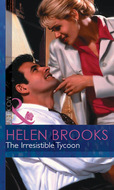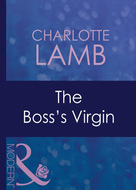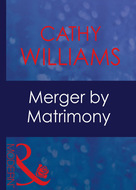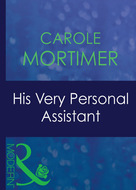Książki nie można pobrać jako pliku, ale można ją czytać w naszej aplikacji lub online na stronie.
Czytaj książkę: «To Tame a Proud Heart»
“You don’t approve of me, do you?”
“No, I don’t.” Oliver’s words were blunt. “I don’t approve of women like you, who were raised in the lap of luxury and swan through life thinking that hard work is something best left alone.”
That stung, but Francesca didn’t say anything.
“But so long as you do your job competently we’ll get along just fine. Abuse your position and you’ll soon discover the limits to my tolerance….”
CATHY WILLIAMS is Trinidadian and was brought up on the twin islands of Trinidad and Tobago. She was awarded a scholarship to study in Britain, and went to Exeter University in 1975 to continue her studies into the great loves of her life: languages and literature. It was there that Cathy met her husband, Richard. Since they married, Cathy has lived in England, originally in the Thames Valley but now in the Midlands. Cathy and Richard have three small daughters.
To Tame a Proud Heart
Cathy Williams

MILLS & BOON
Before you start reading, why not sign up?
Thank you for downloading this Mills & Boon book. If you want to hear about exclusive discounts, special offers and competitions, sign up to our email newsletter today!
Or simply visit
Mills & Boon emails are completely free to receive and you can unsubscribe at any time via the link in any email we send you.
CONTENTS
CHAPTER ONE
CHAPTER TWO
CHAPTER THREE
CHAPTER FOUR
CHAPTER FIVE
CHAPTER SIX
CHAPTER SEVEN
CHAPTER EIGHT
CHAPTER NINE
CHAPTER TEN
CHAPTER ONE
FRANCESCA WADE was not a person given to nerves. She had the resilient self-confidence which came naturally to those who were good-looking or wealthy. In her case, both.
Right now, though, with her eyes dutifully glued to Kemp International’s promotional magazine on her lap, she was feeling decidedly tense. She might have impulsively made the decision to come here, but she was discovering fast that this was the last place she wanted to be, and the temptation to take flight was enormous.
She kept reading, glancing covertly at her watch every so often, wondering where the hell The Man was. She had been shown into his outside office forty minutes previously, had smilingly been informed that Mr Kemp would be with her shortly, and here had she sat since. Waiting.
When the door opened she glanced up hopefully, and tried to wipe the growing resentment off her face.
‘Mr Kemp will see you now.’ It was the same smiling face that had ushered her into the office—neat grey little bun caught at the nape of her neck, navy blue suit, plumpish figure. She stood aside and Francesca made an effort to smile pleasantly back as she was led along the corridor to an intimidating mahogany door.
Suddenly the nerves gave way to something else—something more like alarm—and Francesca’s mouth was dry as the door was pushed open.
The stylish designer suit which she had plucked from the wardrobe and donned because she thought that it conveyed the right image of businesslike efficiency now felt starched and uncomfortable. She was not accustomed to being so carefully dressed. She preferred casual clothes. She nervously smoothed down the skirt and looked around her, her eyes settling on the figure in the chair, his back towards her.
Behind her the door closed deferentially, and the figure in the chair swung around.
What had she expected? She realised that she had no idea—vague impressions, yes. She had spent weeks listening to her father’s well-placed insinuations that it was time she found herself a job, that she couldn’t sit back and indulge in useless creature comforts for ever, to him telling her that he knew someone—the son of a friend of his, a charming fellow.
It had been a quiet game of gradual persuasion, aimed at eroding her objections—the age-old water-dripping-on-a-stone technique—so that now, standing here, she found that she could hardly recall any recent conversation with her father which hadn’t been vaguely permeated with descriptions of the wretched Oliver Kemp.
‘He’s a self-made man,’ her father had told her in his early, enthusiastic phase, before her constant, stubborn refusals to have her life sorted out for her had obliged him to take a more subtle stance. ‘Grabbed the proverbial boot-laces and hauled himself up, inch by inch, until now he’s worth millions.’
That had conjured up images of a sour-faced young man grappling up the face of a cliff, growing ever fatter on the way as he made money and did all those wonderful things which had clearly awed her father.
The man facing her was not fat. Nor was he sour-faced. He had a disturbing brand of good looks—the sort of good looks which she had never before encountered among her young rich set. Every feature was strong and aggressive and his light blue eyes were mesmerising, hypnotic.
He stared at her openly, not blinking, until she lowered her eyes. ‘Sit,’ he commanded—a coldly uttered monosyllable that made her flinch.
He gave no apologies for having kept her waiting, but then he didn’t strike her as the sort of man who went in much for apologising. Probably, she thought, he didn’t even know how to spell the word.
She sat down opposite him, across the gleaming boardroom table, at one end of which was a word processor and several sheets of paper.
‘How did you hear of this job?’ he asked bluntly. ‘It wasn’t nationally advertised.’
‘From my father,’ Francesca confessed reluctantly, already on the defensive for reasons which she couldn’t even identify.
‘Ah, yes.’ He stared at her, and she thought irritably, What does that mean?
‘He mentioned that you were a friend of his and that you were looking for a secretary.’ She was even more irritated to find herself rushing into a little explanatory speech. ‘He thought that I might be interested.’
‘I had lunch with your father weeks ago,’ Oliver informed her coolly. ‘How is it, if you’re that interested in finding work, that you’ve only now decided to come here for an interview?’
Interview? she wanted to ask. What interview? This was more like a cross-examination. What exactly was she guilty of? she wondered.
‘Unless, of course, you’ve been busy going to other interviews?’
He let the question hang in the air challengingly, while he continued to look at her with coolly polite indifference.
‘Not as such,’ Francesca admitted, disliking him more with each passing minute.
‘Not as such? What does “not as such” mean? Either you’ve been going to interviews or you haven’t.’
‘This is the first,’ she muttered, trying to comfort herself with the thought that she didn’t really want this job anyway, that she had been goaded into it by her father.
‘And how long is it since you left college?’ He appeared smilingly vague. Did he, she wondered, think that she had been born yesterday? He would know exactly how long it was since she had left college because her father would have told him.
‘Several months.’
‘So, if you haven’t been working or even, as you tell me, looking for a job, what were you doing for “several months”? Resting?’
‘Look, Mr Kemp,’ she said, through gritted teeth, ‘I came here for an interview. All these questions you’re asking me aren’t relevant to whether or not I’m capable of doing the job, are they?’
‘Miss Wade—’ he leaned forward and there was a soft, cold threat in his voice ‘—you don’t decide what’s relevant or what’s not. I do. If you don’t like it, then the door is right behind you.’ He stared at her, and for a split second she was seriously tempted to leave, but strangely she didn’t want to be browbeaten by this man.
‘So,’ he said with the same unsettling softness in his voice, ‘are we going to continue?’
She nodded. There really was something very threatening about this man, she thought. It sat on his shoulders like an invisible cloak.
‘Shall I tell you why you haven’t bothered to stir yourself into getting a job sooner, Miss Wade?’ he asked with pointed casualness. ‘Your father is a rich man, and rich girls have no need for jobs. No doubt jobs get in the way of late nights, partying, men—’
Francesca’s head shot up at that one. ‘That’s an insult, Mr Kemp!’ she snapped. ‘You have no right to make assumptions about my character!’
He shrugged negligently and stood up. She watched him as he strolled across to the window, one hand casually thrust into his trouser pocket, his face half turned away as he idly surveyed the scene outside.
There was a panther-like grace about him. His body was lean, muscular, as much of a threat as his dark good looks. All in all, she didn’t like him—about as much as he didn’t like her. He had no intention of employing her, of course. No doubt the only reason he had agreed to see her in the first place was because he vaguely knew her father. She should never have let herself be emotionally railroaded into this.
‘You need to settle down,’ her father had told her the evening before. ‘You’re a bright girl—too bright for a life of constant parties and holidays and shopping.’
For the first time she had sensed a certain amount of irritated despair in him. There had been no gentle teasing in his voice, none of the sly nagging in which he took great amusement.
He was right, she had thought reluctantly. She had left her expensive private school at eighteen, with three A levels under her belt, had sailed through a very expensive secretarial course, which she had taken simply because she couldn’t face the thought of going to university, and ever since then had done very little about finding a job.
She frowned at the image her mind threw up of herself—too rich, too pretty, content to drift along with her crowd of friends who appeared to fritter their lives away happily doing nothing in particular, or else indulging in sporadic bursts of fruitful energy when they would do a course on photography or cordon bleu cookery, or anything else that enjoyably absorbed a bit time but didn’t inconveniently leave an aftertaste for something more.
She wasn’t like that. She knew that. But if she wasn’t why had she allowed herself to flow with the tide instead of taking her life in her own two hands?
Oliver Kemp had turned to face her. His back was to the window now, and the harsh, winter sun threw his face into angular shadows.
‘The fact is, Miss Wade, that I don’t know precisely what your motives are in coming here, but if the only reason is to get your father off your back then you’ve come to the wrong place.’
He hadn’t smiled once, she realised, since she had walked into this office.
‘Of course that’s not the reason why I’m here—’ she began, reddening because there was too much truth in his observation for comfort, and he cut in abruptly.
‘Really?’ The ice-blue eyes raked over her thoroughly, and clearly disapproved of what they saw.
‘I apologise for taking up your time, Mr Kemp,’ Francesca said stiffly, standing up. ‘But I’m afraid I made a mistake in coming here; I’m afraid that I can’t accept any job you have to offer.’
‘Sit back down, Miss Wade, and kindly do not think about leaving until I am through with you.’
‘I have no intention of sitting back down, Mr Kemp,’ she replied equally coldly, ‘and kindly do not patronise me by treating me like a child.’
‘I wouldn’t,’ he said smoothly, ‘if you would start acting like an adult. Your father mentioned that you needed to settle down, that he was at his wits’ end with you. God only knows what sorts of high jinks you’ve been getting up to, but I can well imagine. The fact is that I don’t really give a damn what you do or don’t do in your personal time, but my company isn’t a rehabilitation clinic and I’m not in the business of setting wayward children back on the straight and narrow.’
Francesca actually only managed to absorb part of this. Her mind seemed to shut off when he got to ‘high jinks’, and anger flooded through her like a crashing tidal wave.
‘I am not,’ she managed to splutter, ‘some kind of charity case, Mr Kemp. I was not obliged to come here and you are certainly not obliged to give me this job!’
‘No,’ he agreed, but his expression was shuttered.
‘And for your information I am not a wayward child!’
‘Really?’ Mild disbelief bordered on downright indifference, but he wasn’t about to let her put her point across. He pointed to the word processor on the table.
‘Let’s dispense with the histrionics,’ he said coolly, making her sound, she thought furiously, like a candidate for the local mental asylum. ‘I might as well find out if you’re qualified for the job anyway. I want you to type the document at the side of the computer, and then I’ll dictate some letters to you.
‘Your father said that your secretarial skills were excellent but—’ he looked at her with enough disbelief to make her teeth snap together in anger ‘—whether that was paternal pride talking is left to be seen.’
Francesca smiled sweetly at him and rose to go over to the terminal. ‘Indeed,’ she said. This at any rate was one area in which she was supremely confident. ‘And, forgetting paternal pride,’ she said, sitting down and quickly switching on the machine, ‘anything I learnt at secretarial school might well have been forgotten after six months of partying, late nights and—what was it? Oh, yes—men. And high jinks and debauchery. Wouldn’t you agree?’
She threw him another sweet smile. He didn’t smile back at her, but there was a sudden shift in his expression, and she glimpsed behind the powerful, aggressive face a suggestion of charm that was an unnerving as his insolence had been.
She looked away quickly and began typing, her fingers flying smoothly over the keyboard. She could feel Oliver Kemp watching her, perched on the edge of the boardroom table, one hand resting lightly on his thigh—watching and waiting for her to sink obligingly to the level of his preconceived notions of her.
She glared at the word processer. True, she had come here of her own accord; true, her father, although he hadn’t actually arranged the interview himself had hinted long and hard enough. He had also caught her at her weakest moment.
She frowned, and wondered whether she would be sitting here now if she had not spent that one misguided night with Rupert a few days before. Dear Rupert—tall, blond, carefree, with more money than sense most of the time. Her father thoroughly disapproved of him, and when he had discovered her whereabouts he had hit the proverbial roof. It had made not the slightest difference that Rupert Thompson held about as much sexual allure for her as a baked potato.
Her eyes slid across to where Oliver was sitting. If her father absolutely had to interfere, she thought, the least he could have done would have been to recommend her to someone halfway human—someone easygoing and amiable. Oliver Kemp, she decided, was as easygoing and amiable as a cyclone.
She printed the five pages of typed document and handed them to him with a blankly polite expression.
The cold blue eyes skimmed over them, then he read them more slowly. Checking for errors, she thought. No doubt hoping for them. If any existed he could go back to her father with a rueful shake of his head and say, in all truth, that she just had not got the necessary skills to work for him, but that he would keep his ear to the ground as a favour to him.
Maybe, she thought suddenly, I should have inserted enough mistakes to have guaranteed that rueful shake of the head. But her only thought at the time had been to show the damned man that she wasn’t the completely frivolous nitwit that he obviously thought she was. Shame. The best ideas, like the best retorts, always came to mind after the event.
‘Not bad.’ He deposited the sheets of typed paper next to him and walked across to the door, expecting her to follow, which she did, brushing past him then following him towards the office where she had sat for forty minutes earlier.
His own office was through the connecting door. It was huge, with two desks, one of which was his, the other housing a computer terminal and printer. Extending along one side of the room was a floor-to-ceiling bookcase, handmade in the same rich dark wood as the rest of the furniture, with rows of books on electronics.
Kemp International had cornered the market in sophisticated electronic equipment, and had always managed to stay one step ahead of its rivals.
Francesca eyed the books and wondered whether this was Oliver Kemp’s personal taste in literature as well. Was he one of those men who ate, slept and dreamt work?
‘I would expect you to be au fait,’ he said, following the direction of her eyes, ‘with the contents of most of the books on those shelves. Working for me isn’t simply a question of being an adequate typist.’
‘So you’ve decided that I’m good enough for the job, Mr Kemp?’ she asked, with an expression of surprise. She didn’t know whether to be astounded or dismayed by this. ‘Does this mean that you don’t think my father’s verbal curriculum vitae was based entirely on paternal pride?’
He sat back in his swivel chair and linked his fingers together. ‘Sarcasm is not a trait I admire in a secretary,’ he drawled.
Oh, dear, oh, dear, oh, dear, Francesca felt like saying; then we might as well call this a day, mightn’t we? But she swallowed down the rejoinder. Her father would be elated that she had taken him up on his suggestion, that she had landed this job through her own skills in the end, and she dearly loved him.
‘I do apologise,’ she murmured, and he frowned at her.
‘You’ve proved,’ he said, giving her reply the benefit of the doubt, ‘that you can type.’
‘And that I can read,’ she pointed out. ‘I shall consume the contents of those books avidly.’
His eyebrows flew up at that, and she hurriedly began stammering out a suitable apology.
He waited patiently until her voice had fizzled out into a series of fairly inaudible noises.
‘Good. Because when clients call with queries you will have to respond to them in a coherent, knowledgeable fashion.’
He paused, and she said into the silence, ‘What happened to your last secretary?’
‘My last secretary,’ he said lazily, ‘emigrated to Australia to live with her daughter three years ago. Since then I’ve been subjected to a string of women ranging from the downright dim to the misplaced intellectual.’
So you wouldn’t describe yourself as fussy? Francesca wanted to ask. ‘I see,’ she said, only, in fact, seeing a series of hopeless confrontations ahead of her.
‘You, at least, have started off in vaguely the right direction. You can spell at any rate.’ He looked at her through his lashes, his face expressionless. ‘Which brings me to the obvious question. Why are you here?’
‘I thought you knew why I was here,’ she answered, bewildered by the question. ‘I’m a spoiled brat who—’
‘Why are you really here?’ he interrupted impatiently. ‘What are you doing here when you could have got yourself a job at any number of companies if you’d wanted. Your father informed me that you had excellent A level results. Why didn’t you go to university?’
Francesca looked at him resentfully, not liking the way he was manoeuvring her into a position of self-defence.
‘Your father wanted you to go to university.’
‘He did,’ she agreed.
‘He wanted you to study economics, I believe.’
‘Did you talk about anything at this lunch of yours apart from me?’ she asked with irritation. ‘I suppose you also know what dress size I am, and what my favourite colour is as well?’
She hadn’t expected a response to that, but he looked at her very carefully, his eyes roaming over her body and sending a reeling sensation of alarm through her. Men had looked at her before—in fact she was quite used to interested stares—but she had never felt this nervous prickle down her spine.
‘Size eight, and, with your hair, probably green—dark green.’
‘I didn’t go to university,’ she said hurriedly, flushing, ‘because I wanted a break from studying.’
‘A break to do what?’
‘To enjoy myself,’ she muttered feebly, feeling like a cornered rat.
‘Ah, now we’re getting to the heart of the matter, aren’t we?’
‘Are we?’ she asked, already feeling her hackles beginning to rise.
‘You may have all the qualifications for this job, and God only knows I’ve seen more than enough internal applications by way of comparison, but don’t for a minute imagine that I shall tolerate your personal life spilling over into your professional one. Working for me isn’t going to be a game to be endured simply to humour your father. I don’t want to see you enter this office either late or the worse for all-night partying. Do I make myself clear?’
‘As a bell,’ she said coldly.
‘Nor do I expect you to spend your time rushing through your work so that you can get on the telephone to your numerous admirers.’
‘I don’t have numerous admirers, Mr Kemp,’ she snapped. ‘And I can’t believe that Dad would have told you that I did.’
He shrugged. ‘He mentioned some playboy who was always in tow, and playboys tend to travel in packs, don’t they? They don’t feel complete unless they’re enjoying their wild times in the company of like-minded individuals.’ There was contempt on his face.
‘You don’t approve of me, do you, Mr Kemp?’ she asked stiffly.
‘No, I don’t.’ His words were blunt. He was not the sort of man to beat about the bush, nor was he the sort to parcel up unflattering thoughts underneath pretty wrapping.
‘I grew up poor, Miss Wade, and I made it on my own. I don’t approve of playboys who can’t see further than having a good time. Nor do I approve of women like you, who were raised in the lap of luxury and swan through life thinking that hard work is something best left alone. You obviously have the brains to do something for yourself, but that doesn’t appeal, does it? Hard work is rarely glamorous to those who don’t have to do it.’
That stung. She felt angry hurt prick the back of her eyes but she didn’t say anything. She could hardly deny that she had been indulged all her life, could she? By the time she had been born, late in her parents’ lives, her father had already made his first million and had been well on his way to making several more.
Would things have been different if her mother had lived? Probably. But in the absence of a mother her father had spoilt her, doted on her, bought her everything that her heart had desired. There was so much, she later realised, that he had wanted to make up for—for the lack of a mother, for the long hours he worked and, most of all, it had been his way of showing her how much he loved her.
But maybe Oliver Kemp was right. Maybe showering her with material things had taken away from her that hungry edge that drove people on to succeed. She thought of her friends—all pampered, all the indulged products of wealthy parents, charming enough people to whom hardship was unknown and suffering was measured in terms of missed skiing holidays.
‘But those are my personal feelings,’ he said coolly, breaking into her introspection. ‘Personal feelings have no place in a working environment, though. Just so long as you do your job competently then we’ll get along just fine. Abuse your position, my girl, and you’ll soon discover the limits to my tolerance.’
They stared at each other, and she felt panic rise up in her throat. This was never going to work out. He disliked her and he disliked everything that she stood for.
‘Thank you for making me feel so warmly welcomed into your organisation, Mr Kemp,’ she said stiffly, and his lips curved into an unwilling smile which totally altered the forbidding angularity of his face.
He stood up to show her into her office. ‘I see,’ he murmured over his shoulder, their eyes meeting, ‘that that biting tongue of yours might be something I shall have to tolerate. However,’ he continued, turning away and walking into the outer office, ‘there’s no need to dress in designer clothes.’
He sat on the edge of her desk, waiting for her to sit down, then he leant towards her. ‘I say this for your own benefit. The people with whom you’ll be mixing don’t come from such a rarefied background as you do.’ He reached out to finger the lapel of her expensive shirt. ‘Too much of this and you might find yourself distanced by a group of very nice people indeed.’
She didn’t pull away from his touch, but she wanted to. Instead, as he strolled back into his office, she found that her body had become rigid, and she only began to relax as she sorted out the stack of typing which lay at the side of the computer.
At twelve o’clock he emerged from his office and informed her that he would be out for the rest of the day. She watched as he slipped on his jacket, adjusted his tie, and breathed a sigh of relief when the door closed behind him.
He made her tense and it wasn’t simply due to the insults which he had flung at her. There was something watchful about him—something that stirred a certain uneasy wariness in her. He was like a shark, circling the water around her, content to watch, but she would do well to remember that sharks bit.
He had left her enough work to fill her time until five o’clock, but in fact she stayed on until nearly six-thirty, familiarising herself with his filing system, and familiarising herself also with some of the books on the shelf which he had informed her would have to be read, digested and memorised.
She had no idea how much of that had been said because he contemptuously believed that she would never manage such a task, but if she was to stay working with the loathsome man then she would make damned sure that by the end of her stint he would have to swallow everything he had said.
Her father was not at home when she got back—tired, but oddly elated at having spent the day doing something productive—but Rupert was. Bridie had let him in and Francesca found him in the sitting room, on his second glass of gin and tonic.
He looked at her as she walked in and said without preamble, ‘Nasty rumour has it that you’ve got a job.’
Francesca looked at him and grinned. She was very fond of Rupert Thompson. She had known him casually for two years, but it was really only in the last seven months that they had become close, much to her father’s disgust. He had no patience with men like Rupert. He thought that he should buckle down and find himself a job or, failing that, join the Army—as if joining the Army would suddenly change sunny-tempered Rupert into an aggressive work-machine.
The only thing that held him in check was his daughter’s repeated reassurance that nothing was going on between them. Rupert was fun. He didn’t want her as a passionate lover and the feeling was mutual.
She took off her coat, tossed it onto a chair and went across to the bar to pour herself a glass of mineral water.
‘Nasty rumour,’ she said, sitting down on the sofa, kicking off her shoes and tucking her feet underneath her, ‘is right.’ She looked at him. ‘You could always follow my example,’ she added, and he grinned at her infectiously.
‘And lose my reputation? Never.’
As it happened, he did have a job of sorts, but in typical Rupert-style he had long ago decided that delegation was a talent that was much underrated. And, in fairness, it worked for him. His parents had died ten years ago, leaving him a fortune, along with a vast estate which he had happily left in the efficient hands of the managers who had looked after it from the year dot.
He signed things that needed his signature, spent enough time at his country home to ensure that things were being run profitably, and there his input ceased. He made sure that all his employees were treated well, received unstinting loyalty in return, and cheerfully had his good times on some of the immense profits that came his way.
‘So tell all,” he commanded, settling back comfortably with his drink, and Francesca obliged, carefully editing out the unpleasantness of her interview. She wasn’t given to confiding private feelings to other people—a legacy, she had always assumed, of having been the only child of a single-parent family.
‘Kemp,’ Rupert murmured thoughtfully. ‘Kemp, Kemp, Kemp. I know that name.’
‘Their electronic stuff is all over the country, Rupert,’ Francesca said drily. ‘And they’re branching out all the time,’ she heard herself saying. ‘They’ve moved into Europe and are hoping to capture the Far East fairly soon.’ One day, she thought suddenly, and I sound like an advertising brochure. Had Oliver Kemp been that successful in influencing her thoughts? She found the idea of that slightly disconcerting.
‘No, no, no.’ He waved aside the explanation. ‘What I mean is this—I’ve heard of that man personally.’
‘Really?’ She felt a sudden rush of curiosity which, she told herself, she had no intention of satisfying. Oliver Kemp was an arrogant bastard, and whatever he did in his private life had nothing to do with her. She would work for him because a combination of pride and guilt would make her, at least for the time being, but beyond that her interest stopped.
Rupert, immune to subtle shifts in atmosphere, blithely ignored this one and continued in the same thoughtful voice, ‘Oliver Kemp. I’ve seen him around.’
‘You’ve seen most people around,’ she pointed out. ‘You’re hardly one of life’s shrinking violets, are you?’
He laughed, pleased at that. ‘Good-looking chap,’ he said, draining his drink and eyeing the empty glass meaningfully. She ignored the hint. As far as she was concerned he drank too much anyway, and she had no intention of assisting the situation.
Darmowy fragment się skończył.









